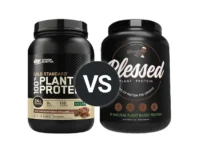Knowledge BaseYou're Questions Answered
Is whey protein good for vegetarians?
Whey protein is a popular dietary supplement known for its high-quality protein content and rapid absorption rate. It is derived from the liquid portion of milk that separates during cheese production. For vegetarians, choosing appropriate protein sources is essential, especially if they avoid certain animal products. Below, we discuss the suitability of whey protein for vegetarians and its benefits.
Whey Protein and Vegetarian Diets
Whey protein is generally considered suitable for lacto-vegetarians, who include dairy products in their diet. As whey protein is derived from milk, it does not involve the consumption of animal flesh, making it compatible with vegetarian dietary practices that allow dairy1. However, it is not suitable for vegans or those who avoid all animal-derived products, including dairy.
Benefits of Whey Protein for Vegetarians
1. Complete Protein Source
Whey protein is a complete protein, meaning it contains all nine essential amino acids that the body cannot produce on its own. This makes it an excellent choice for vegetarians who may have limited access to complete protein sources. Essential amino acids are crucial for muscle repair, growth, and overall bodily functions2.
2. High Biological Value (BV)
Whey protein has a high biological value, indicating that it is efficiently absorbed and utilized by the body. This makes it an effective protein source for supporting muscle protein synthesis and recovery, which is particularly beneficial for vegetarians who engage in regular physical activity3.
3. Convenience and Versatility
Whey protein powder is convenient and versatile, making it easy to incorporate into various meals and snacks. It can be used in shakes, smoothies, baking, and cooking, providing a quick and easy way to boost protein intake. This is especially helpful for vegetarians who may have limited high-protein food options.
4. Support for Muscle Maintenance and Growth
For vegetarians, maintaining muscle mass can be challenging if dietary protein intake is inadequate. Whey protein supplementation can help ensure sufficient protein intake, supporting muscle maintenance and growth, especially when combined with resistance training.
Considerations
1. Lactose Intolerance
While whey protein is generally well-tolerated, it contains varying amounts of lactose, which may cause digestive discomfort in individuals with lactose intolerance. Whey protein isolate, which has a lower lactose content than whey protein concentrate, may be a better option for those with lactose sensitivity.
2. Not Suitable for Vegans
Since whey protein is derived from milk, it is not suitable for vegans who avoid all animal-derived products. Vegans may opt for plant-based protein powders, such as pea, soy, or rice protein, as alternatives.
- Hoffman, J. R., & Falvo, M. J. (2004). Protein–which is best? Journal of Sports Science & Medicine, 3(3), 118-130.
- Phillips, S. M., & Van Loon, L. J. C. (2011). Dietary protein for athletes: From requirements to optimum adaptation. Journal of Sports Sciences, 29(sup1), S29-S38.
- Rutherfurd, S. M., Montoya, C. A., Zou, M. L., & Moughan, P. J. (2015). Digestible indispensable amino acid score (DIAAS) and digestible amino acids in animal and plant-based protein sources. Journal of Animal Science and Biotechnology, 6(1), 1-7.
Related Questions
Related Reviews

Your Answer
We are a participant in the Amazon Services LLC Associates Program, an affiliate advertising program designed to provide a means for us to earn fees by linking to Amazon.com and affiliated sites.



